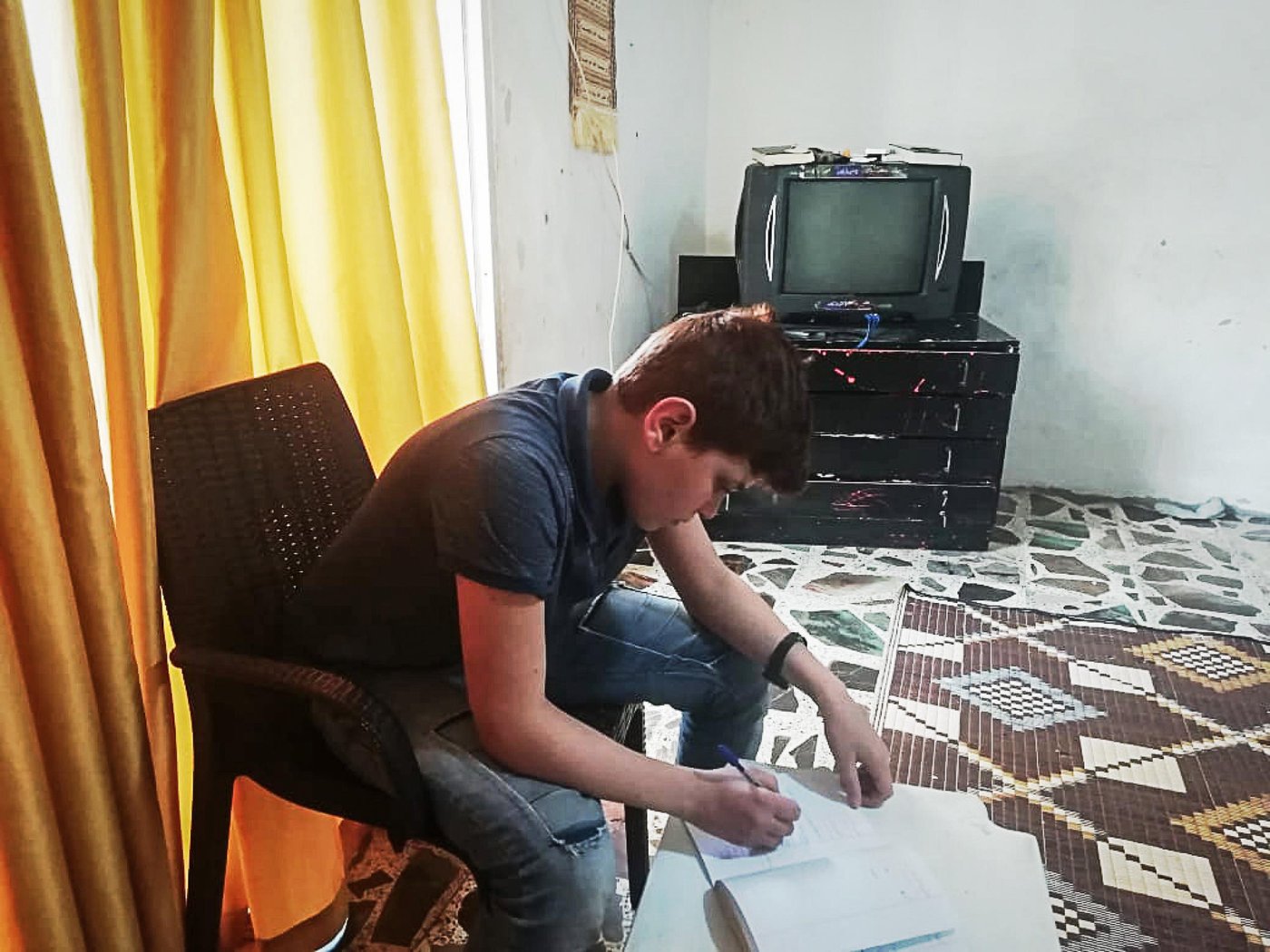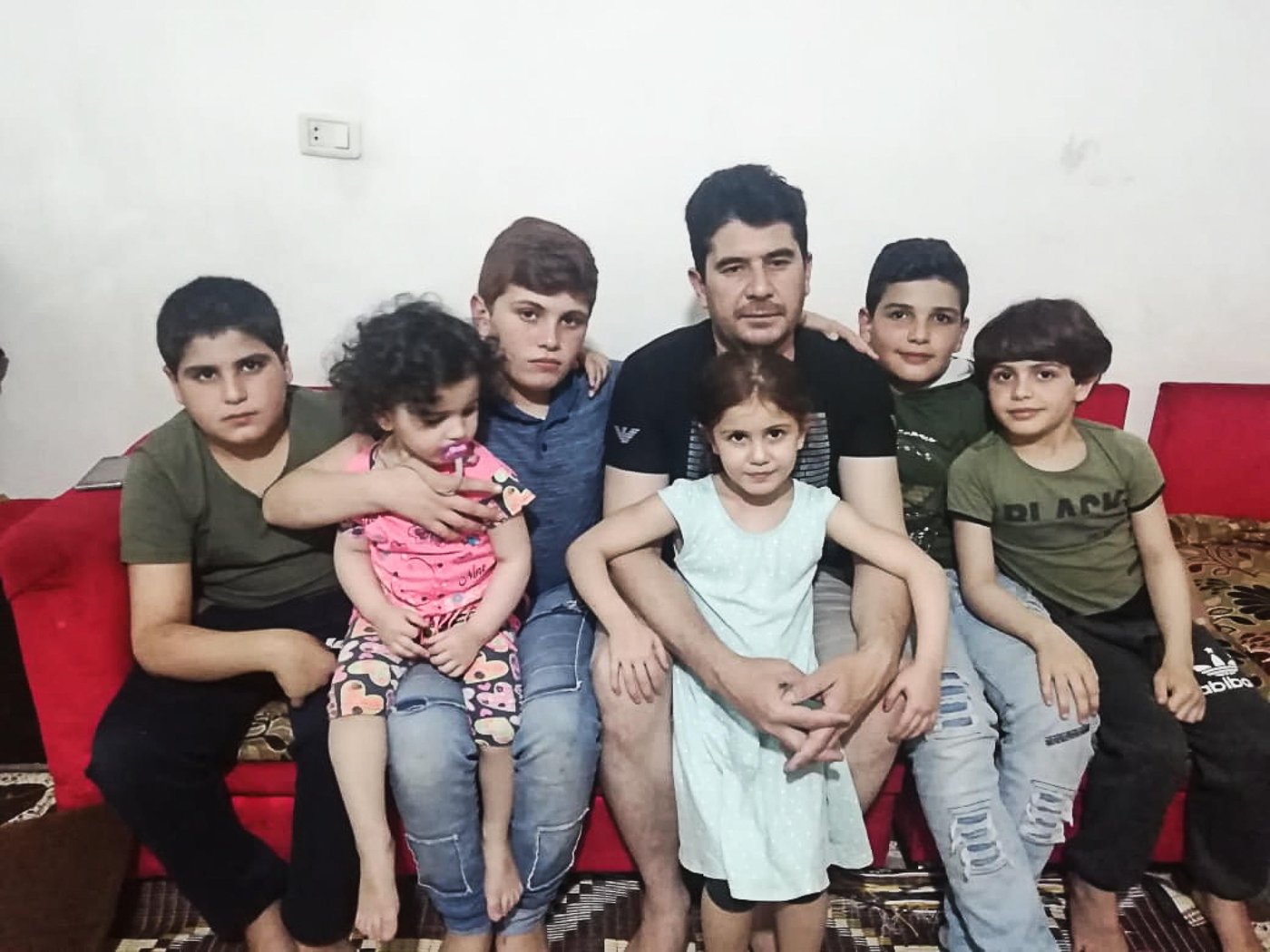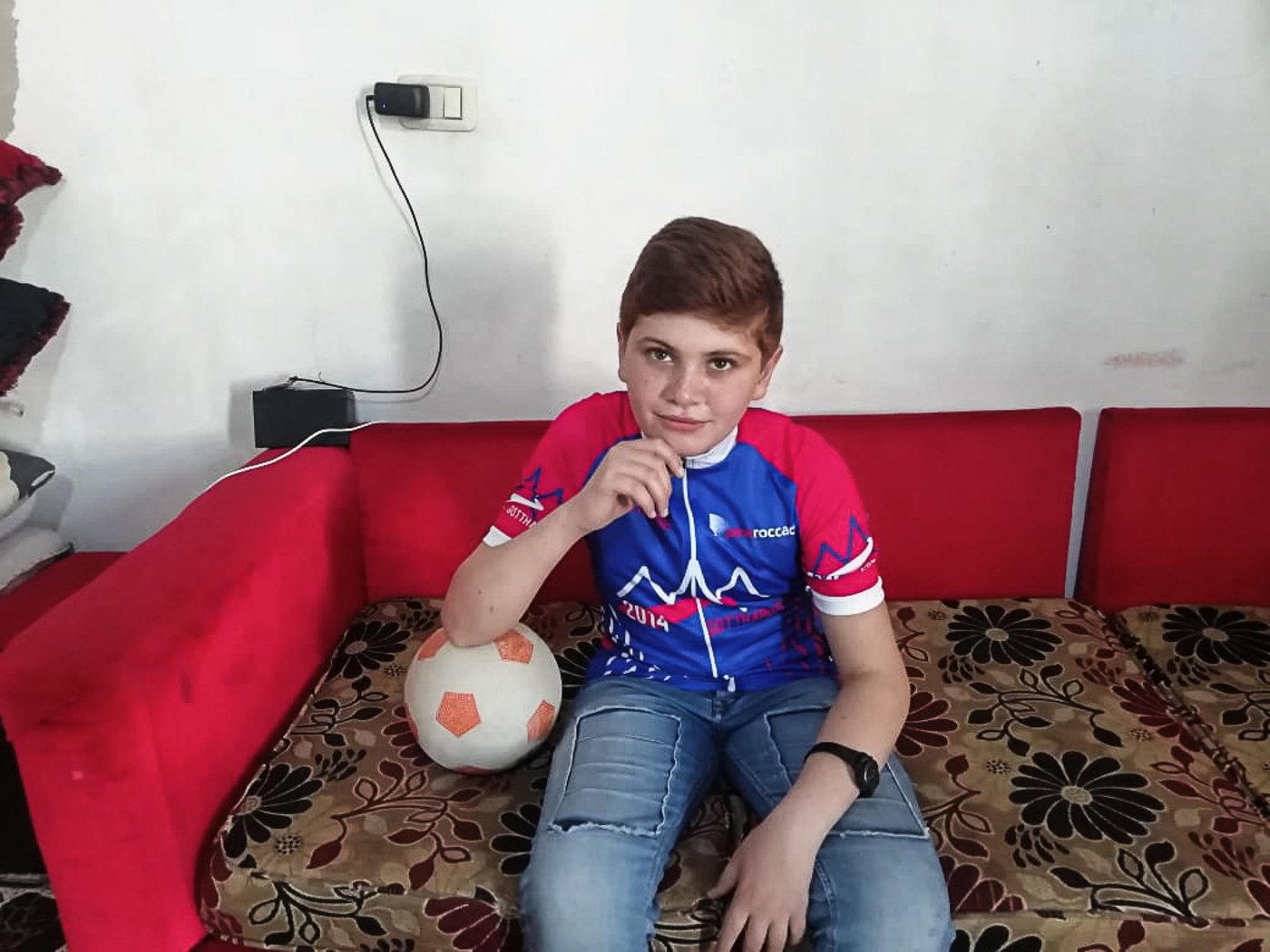Siden koronautbruddet har Flyktninghjelpen jobbet døgnet rundt for å sikre at barn og ungdom på flukt kan fortsette utdanningen.
Mohammad (13) er et av disse barna. Han er opprinnelig fra Hama i Syria, men flyktet til Libanon sammen med familien for seks år siden. Nå bor han sammen med foreldrene, tre søstre og tre brødre i en liten leilighet utenfor Tripoli, nord i Libanon.
På grunn av smittefaren og nedstenging av skoler og læringssentre, er ikke Flyktninghjelpens ansatte i stand til å ha direkte kontakt med barna og foreldrene. Det er Mohammeds mor, Fatima, som har sendt oss bildene, og det er våre kollegaer i Libanon som har intervjuet Mohammad og moren hans på telefon.
– Selv om det er seks år siden vi kom hit, lengter jeg tilbake til hjemlandet mitt hver eneste dag. Vi kunne spille fotball så mye vi ville utenfor huset vårt, og vi hadde en stort hage der ingen plaget oss, sier Mohammad. – Her kan vi aldri fullføre en fotballkamp. Naboene blir alltid irriterte og ber oss om å slutte å sparke fotball og reise hjem til Syria.

Utdanningskrise også før koronaen rammet
Ni år inn i Syria-krisen har Libanon en av de største konsentrasjonene av flyktninger per innbygger i verden: Om lag 900.000 syriske flyktninger og rundt 29.000 palestinske flyktninger fra Syria. I tillegg kommer om lag 500.000 palestinere og deres etterkommere som flyktet fra Palestina etter 1948.
Til tross for betydelig innsats fra landets myndigheter, ulike giverland og hjelpeorganisasjoner, mangler mange syriske flyktningbarn i Libanon utdanningstilbud. Tall fra FN viser at over halvparten av flyktningbarna mellom tre og atten år er uten skoletilbud.
Flyktningbarna betaler prisen
Koronakrisen har ført til stengte skoler og satt utdanningen på vent for tusenvis av elever i Libanon. Mange barn og unge på flukt har allerede gått glipp av mange års utdanning på grunn av krig og konflikt. Uten hjelp risikerer de å havne enda lenger etter.
Da undervisningen stoppet på grunn av smittefaren, ble Mohammad og brødrene hans veldig opprørte. Å dra til Flyktninghjelpens læringssenteret hver morgen, møte venner og delta i undervisningen var en del av deres daglige rutiner og noe de gledet seg til.
– Det er ikke lett å være hjemme i den trange leiligheten. Vi kjeder oss og har lite å ta oss til. Men det er ikke noe vi kan gjøre med det, sier Mohammad.

Fjernundervisning
– For å dekke behovene til Mohammad og 1.200 andre barn som går på våre læringssentre i Libanon, har vi satt i gang fjernundervisning. Vi bruker mobiltelefoner og WhatsApp, kombinert med oppfølgende telefonsamtaler for å gi veiledning og støtte, forteller Rayan El Baf, en av Flyktninghjelpens ansatte som jobber med å sikre barn skolegang i Libanon.

– Fjernundervisningen har blitt redningen for meg og barna, sier Fatima, Mohammeds mor. – I stedet for å overlate dem til seg selv i denne vanskelige tiden, har Flyktninghjelpen virkelig vist at de fortsetter å bry seg om barnas utdanning og liv. Hjelpen både barna og jeg får gjøre hverdagen lettere. Barna blir mer harmoniske og får bedre selvtillit.
Med støtte fra EUs humanitære hjelpeorganisasjon (ECHO) gir vi også Mohammad og søsknene psykososial støtte gjennom programmet Bedre læring. Slik blir de bedre i stand til å takle psykisk stress og den utfordrende situasjonen med nedstenging av skoler og samfunn.
– Jeg elsker å gjøre puste- og balanseøvelser. Selv om det er litt vanskelig, hjelper de forskjellige teknikkene meg til å roe ned og redusere stresset, sier Mohammad.
– Jeg klarer også bedre å fokusere på det jeg skal gjøre. Jeg har klart å fortsette med fotballtreningen, og jeg drømmer fortsatt om å bli profesjonell fotballspiller, legger han til.

Hjelpen kommer frem
– Selv om læringssentrene våre ble stengt på grunn av koronakrisen, sluttet vi aldri å undervise og følge opp barna, sier Rayan El Baf. – Vi har regelmessig telefonkontakt med både barna og foreldrene for å høre hvordan de har det, følge opp undervisningen og gi råd og veiledning.
Etter at Flyktninghjelpens læringssenter stengte på grunn av smittefaren tilbringer Mohammad mesteparten av tiden sin hjemme. Han følger fjernundervisningen, gjør lekser og leker med søsknene sine. Noen ganger hjelper han også faren, som tjener penger på å selge kaffe på gata.
– Fjernundervisningen er gull verdt. Den sikrer videre læring, sørger for gode rutiner og bringer med seg masse positivitet inn i en ellers vanskelig hverdag, sier Fatima.
Nye løsninger
– Selv om vi tar i bruk fjernundervisning, klarer vi å opprettholde og utvikle nære og positive bånd til barna, og foreldrene er blitt mer engasjert og involvert i barnas utdanning. Vi prøver alltid å finne nye måter og løsninger for å håndtere eventuelle utfordringer som måtte oppstå. Imidlertid er den vanskeligste utfordringen kanskje at vi ikke kan svare når barna spør oss om når de kan komme tilbake til læringssenteret for å se oss og vennene sine igjen, sier Rayan.
– Læringssenteret var et sted hvor jeg følte meg trygg. Jeg savner både vennene mine og lærerne. Men mest av alt ønsker jeg å returnere til Syria, avslutter Mohammad.
Les mer om vårt arbeid i Libanon og våre utdanningsprogram.


